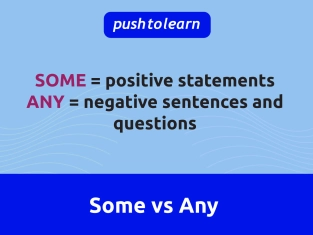by PushtoLearn
Fewer vs Less
Table of Contents
Fewer and Less Exercises
TLDR
✔️ Fewer = Countable (books, apples, students)
✔️ Less = Uncountable (water, sugar, time, money)
✔️ Exception: Use less with time, money, and distance.

Fewer vs. Less – The Basic Rule
|
Word |
Used With |
Example |
|
Fewer |
Countable nouns (things you can count) |
There are fewer apples in the basket. 🍏 |
|
Less |
Uncountable nouns (things you cannot count) |
There is less water in the glass. 💧 |
📌 Tip: If you can count it (1, 2, 3…), use fewer. If you cannot count it, use less.
When to Use "Fewer"
Use fewer with countable nouns (things that have a plural form and can be counted).
✔️ Examples:
-
There are fewer students in the classroom today. (students = countable)
-
I need to eat fewer cookies. (cookies = countable)
-
We have fewer chairs than we need. (chairs = countable)
📌 Quick Test: Can you count it? If yes, use fewer!
When to Use "Less"
Use less with uncountable nouns (things you cannot count individually).
✔️ Examples:
-
There is less sugar in my coffee. (sugar = uncountable)
-
I have less time to study today. (time = uncountable)
-
She drank less milk than her brother. (milk = uncountable)
📌 Tip: If the noun is singular and uncountable, use less.
See also Countable and Uncountable Nouns
Common Exceptions
🚨 "Less" with Time, Money, and Distance
Even though time, money, and distance seem countable, we use "less" with them because they act as uncountable quantities.
✔️ Examples:
-
We have less than 10 minutes left. (time)
-
I spent less than $50 on dinner. (money)
-
It’s less than 5 miles to the city. (distance)
🚨 "Fewer" with Plural Numbers and Items
Even though numbers refer to amounts, they represent countable things, so we use fewer.
✔️ Examples:
-
There were fewer than 50 people at the event. (people = countable)
-
I have fewer than 100 followers on Instagram. (followers = countable)
Common Mistakes with Fewer and Less
|
Mistake |
Incorrect |
Correct |
|
With countable nouns |
There are less apples in the basket. ❌ |
There are fewer apples in the basket. ✅ |
|
With uncountable nouns |
I drink fewer water. ❌ |
I drink less water. ✅ |
|
With time, money, and distance |
I have fewer than 5 minutes. ❌ |
I have less than 5 minutes. ✅ |
|
With plural items |
There are less cars on the road today. ❌ |
There are fewer cars on the road today. ✅ |
📌 Tip: If it’s plural, use fewer. If it’s singular, use less.
FAQ: Common Questions About Fewer vs. Less
Can I use "less" for plural nouns?
➡️ No! Use "fewer" for plural countable nouns.
❌ Less books → ✅ Fewer books
What about "less than 10 items" in supermarkets?
➡️ Technically incorrect! Supermarket signs should say "Fewer than 10 items," but "less" is often used informally.
Is "less people" correct?
➡️ No! "People" is countable, so say "fewer people."
Can I say "fewer money"?
➡️ No! "Money" is uncountable, so say "less money."
What if I’m not sure?
➡️ Ask yourself: Can I count it? If yes, use fewer. If no, use less.

